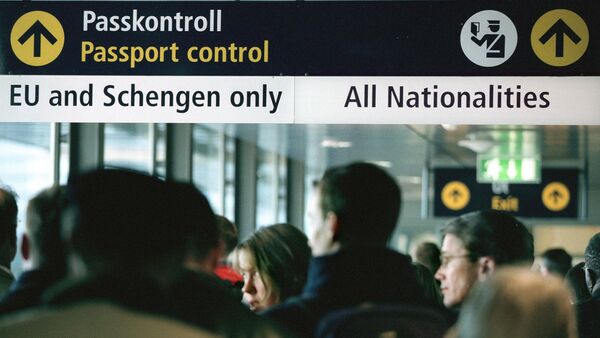The system, called EU Travel Information and Authorization System (ETIAS), is based on the US Electronic System for Travel Authorization (ESTA), and would require travelers to pay a fee to register their visit to the EU online before their arrival at the border.
Earlier this week a source in the EU Commission said that the scheme would charge a five euro ($5.29) registration fee. Although that would be significantly lower than the $13 the US charges for its ESTA online registration, the amount may increase in the future.
EU ministers hope that ETIAS will improve security in the bloc, by allowing for advance irregular migration and security checks on visitors.
Head of Switzerland's Federal Justice and Police Simonetta Sommaruga, who attended the meeting, told the Tagesanzeiger newspaper that the ETIAS proposal was "fundamentally positively received" at the meeting.
"Today the Commission gave us a short presentation of the system. It should be simple, fast and cost-effective. We don't want to build any new hurdles."
Switzerland welcomes "anything that brings security to Europe," Sommaruga added.
As it is an associate member of the Schengen Area but not an EU member, Switzerland currently doesn't have access to the database of Europol, the EU's law enforcement agency, which national police forces use to coordinate their work.
"The goal would be to access all relevant databases with a single query," Sommaruga said.
The EU says its ETIAS registration system will enter into operation in 2020, after its proposed Entry-Exit System (EES) of external border management also comes into operation on January 1 2020.
The EES will register a traveler's name, type of travel document and biometrics and the date and place of entry and exit. It will also record refusals of entry to the Schengen Area.
The EU Commission said it hopes the plan "will facilitate the border crossing of bona fide travelers, detect over-stayers and identify undocumented persons in the Schengen area."
However some EU countries are keen to have ETIAS in place before 2020. Austrian Interior Minister Wolfgang Sobotka said the proposal should come into force "as soon as possible." Slovakian Interior Minister Robert Kalinak, whose country currently holds the rotating EU Presidency, said ETIAS could come into force "at the beginning of next year."




